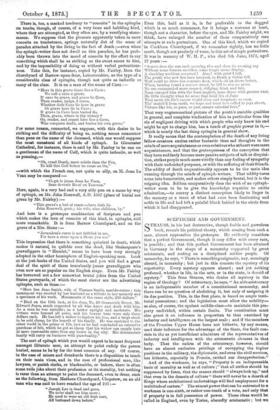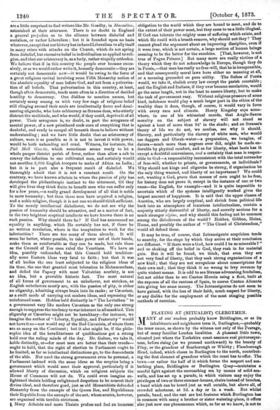SCEPTICISM AND GOVERNMENT.
STRA.USS, in his last destructive, though feeble and garrulous book, reveals his political theory, which coming from such a man, almost approaches the grotesque. He evidently considers. that a perfect Government, though it may differ with every race, is possible ; and that this perfect Government has been attained in Germany in the shape of a monarchy supported by great aristocrats, and resting on a disciplined soldier people. Of monarchy, he says, "There is something enigmatic, nay, seemingly absurd, in monarchy ; but just in this consists the mystery outs superiority. Every mystery appears absurd ; and yet nothing profound, whether in life, in the arts, or in the state, is devoid of mystery." This from Strauss, who denies all mystery in the region of theology ? Of aristocracy, he says, "An able aristocracy is an indispensable member of a constitutional monarchy, and there can be no question of abolishing it, but only of assigning it its due position. This, in the first place, is based on ample terri- torial possessions ; and the legislation must allow the nobility— as also, of course, the opulent middle-class—to maintain this pro- perty undivided, within certain limits. The constitution mush also grant it an influence in proportion to that exercised by industry and intelligence on the largest scale ; and if the members of the Prussian Upper House have not hitherto, by any means, used their influence for the advantage of the State, the fault con- slats in the as yet insufficient admixture of the representatives of industry and intelligence with the aristocratic element in that body. That the cadets of the aristocracy, however, should have an almost exclusive privilege of occupying the higher positions in the military, the diplomatic, and even the civil services, has hitherto, especially in Prussia, excited our disapprobation."
And of the workmen, he says, "Property is an indispensable basis of morality as well as of culture ;" that all strikes should be suppressed by force, that the masses should "always look up," and that even in the domain of culture" there will never be a dearth of Kings whose architectural undertakings will find employment for a multitude of carters." The utmost power thatean be entrusted to a workman is one-sixth, or rather one-tenth of a vote, and only that if property is in fall possession of power. These ideas would be called in England, even by Tories, absurdly aristocratic ; but we area little surprised to find writers like Mr. Goadby, in Macmillan, astonished at their utterance. There is no doubt in England a general prejudice as to the alliance between disbelief and socialism, or rather Liberalism ; but it is founded upon no basis whatever, except that our history has induced Liberalism to ally itself in many crises with attacks on the Church, which do not spring from disbelief, but excessive belief in individualism as applied to reli- gion, and that our aristocracy is, as a body, rather stupidly orthodox. We believe that if in this country the people ever became exces- sively, or as we would rather write it, honestly democratic—they are certainly not democratic now—it would be owing to the force of a great religious revival involving some Fifth Monarchy notion of the absolute equality of men before God, and not from a pulverisa- tion of all beliefs. That pulverisation in this country, at least, though often democratic, tends more often in a direction of decided hostility to democracy. One dislikes to mention names, but certainly many among us with very few rags of religious belief still clinging around their souls are intellectually fierce and domi- neering oligarchs, who hate ochlocracy as Strauss does, who utterly distrust the multitude, and who would, if they could, deprive it of all power. Their arrogance is, no doubt, in part the arrogance of mental power, of a new priesthood cock-sure of everything that is doubtful, and ready to compel all beneath them to believe without understanding ; and we have little doubt that an aristocracy of culture, were it as possible as it is not to invest it with power, would be both unbending and cruel. Witness, for instance, the Pall Mall Go:tile, which sometimes seems ready to let a whole pauper district perish of fever, rather than allow a cab to convey the infection to one cultivated man, and certainly would not sacrifice 3,000 English troopers to make of Africa an India ; but it is in part also a frequent result of disbelief. We thoroughly admit that it is not a constant result. On the contrary, we have known atheists in whom the passion of pity has developed the philanthropic instinct to the uttermost, till they will give lives they think finite to benefit men who can suffer only for a few years,—a really grand development of all that is noble in mere humanity ; but then these men have acquired a religion, and a noble religion, though it is not one we should think sufficient. To the merely intellectual disbeliever, we do not see why the passion of humanity should be attractive, and as a matter of fact, in the two brightest sceptical intellects we have known there is no such passion. Why should there be ? If God has announced no equality in anything, which He certainly has not, if there be no written revelation, where is the temptation to work for the inferiorities ? There are too many of them already. It will seem far better, where possible, to take power out of their hands, make them as comfortable as they can be made, but rule them as the Council of Ten once ruled the Venetians. We have an idea, possibly unfounded, that this Council held tradition- ally some Eastern ideas very fatal to faith ; but that it was of all bodies the one least subjected to the religious ideas of its time, the one that granted most toleration to Mohammedans, and defied the Papacy with most Voltairian acerbity, is not an idea, but a provable historic fact. The most natural of all forms of government to an unbeliever, not stricken, as English unbelievers mostly are, with the passion of pity, is either an oligarchy, admitting always brain into its ranks ; or Cm3arism, as a swift mode of carrying out modern ideas, and repressing the uninformed mass. Hobbes held distinctly in" The Leviathan" to a government very like modern Cmsarism as the only one strong enough to suppress the tendency to war inherent in all mankind. This oligarchy or Cm3arism might not be hereditary—for instance, we imagine the author of "Liberty, Equality, and Fraternity" would not have it so—nor would any of the Red Cmsarists, of whom there are so many on the Continent ; but it also might be, if the philo- sophic idea of the hereditariness of qualifications got a strong hold over the ruling minds of the day. Mr. Galton, we take it, holds distinctly, or—for most men are better than their creeds— ought to hold, that the right of election to Parliament ought to be limited, as far as intellectual distinctions go, to the descendants of the able. Nor need the strong government even be personal, a Parliament imbued with the same ideas as the sceptics being a government which would meet their approval, particularly if it allowed liberty of discussion, which on religious subjects the House of Commons will not do. We could even imagine en- lightened theists holding enlightened despotism to be nearest their divine ideal, and therefore good, just as old Monarchists defended Monarchy from the example of the Queen Bee, and Republicans their Republic from the example of the ant, whose armies, however, are organised with terrible strictness.
Many Atheists and more Theists profess and feel an immense
obligation to the world which they are bound to meet, and do to the extent of their power meet, but they seem to us a little illogical. If God can tolerate the mighty mass of suffering which exists, and which He could with a breath remove, why should not they ? They cannot plead the argument about an improving discipline, even if it were true, which is not certain, a large section of human beings seeming to be the better for the sunshine. [That, however, is not true of Pagan Princes.] But many more are really victims of a theory which they do not acknowledge in Europe, though they do in Persia,—that man has really no free-will, that he is irresponsible, and that consequently moral laws have either no meaning at all, or a meaning grounded on pure utility. -The Safees of Persia would, we take it, abolish every law except the parish constable ; and the English and Italians, if they ever became secularists, would go the same length, not in the least to ensure liberty, but to make the task of government easy. Without religious pressure of some kind, indolence would play a much larger part in the ethics of the wealthy than it does, though, of course, it would vary in form with every race and climate. Henry Kingsley says some- where, in one of his whimsical moods, that Anglo-Saxon morality on the subject of slavery will not stand as against a heat of more than 910 in the shade ; and on Strauss's theory of life we do not, we confess, see why it should. Slavery, and particularly the slavery of white men, who would use daggers and Obeah-water—a preparation, we imagine, of datura—much more than negroes ever did, might be made en- durable by physical comfort, and as for liberty, what basis has it except a doubtful convenience, and a certainty that man is respon- sible to God—a responsibility inconsistent with the total surrender of free-will, whether to priests, or governments, or individuals? Why should not kings and oligarchs be strong, if organisation be the only thing wanted, and liberty of no importance? We could not, wanting a God, prove that masses of men ought to be free, for history does not prove it, except in the instance of one or two races—the English, for example—and it is quite impossible to ascertain which of the systems intelligently worked gives the largest amount of happiness. It is said that the upper classes of America, who are largely sceptical, and shrink from political life back into an atmosphere of luxurious intellectualism, contain a majority utterly distrustful of liberty, and secretly anxious for a much stronger regime, and why should this feeling not be common among the disbelievers of the world ? Hobbes, Gibbon, Heine, Hume, and possibly the author of "The Creed of Christendom," would all defend them.
It may be true, of course, that Intransigente scepticism tends to anarchy, for the steps by which they arrive at their conclusion are different. "If there were a God, how could I be so miserable ? " and so shaking off the belief in God, they rush in for material gain. But it will be found, we think, that even they are not very fond of liberty, that they seek strong organisations of a new kind ; that they are not scrupulous about conscriptions for their own end ; that they think it no wrong to levy revenue by quite violent means. It is odd to see Strauss advocating feudalism, but not odder than to see Canton Murcia using a fleet, built at the expense of all the cantons of Spain, to coerce Canton Alicante into giving her some money. The Intransigentes do not seem to have gained, with the loss of their faith, much respect for liberty, or any dislike for the employment of the most stinging possible methods of coercion.



































 Previous page
Previous page